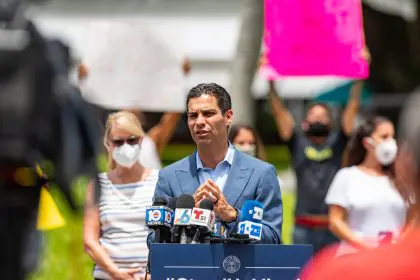
“Being reared in a family of 21 children was very challenging. Because there were so many of us, we had to share many of the basic essentials,” shared Paul Lamar Hunter, life coach, public speaker and author, No Love, No Charity: the Success of the 19th Child . “At breakfast, we would pour our cereal into a cooking pot and several of us would eat together from the pot. We also shared clothes. My brothers and I slept in the same beds, and my sisters did the same as well. When there were not enough beds, some of us had to sleep on the floor. It was difficult because some of my siblings were selfish and did not want to make accommodations for the rest of us. This always caused a ruckus and an occasional spat. However, through it all, the inconveniences of crowded quarters and a short supply of essentials the Hunter family learned to work together through poverty and lack.”
Hunter, who was born in Wisconsin, says he grew up “dirt poor” says by surrounding himself with educated mentors, managing his behavior and having the will to be successful is the reason he’s achieved this level of success.
What are the advantages to being a member of a big family?
The advantages of having a big family is feeling the love from your 20 siblings and not being concerned by other children at school fighting you because your older siblings had your back. By the way, the Hunter family did not have many altercations in school. Another advantage is to know which of your sibling’s are introverts, extroverts and ambiverts are because it will help with the communication process. Each of my siblings has different attributes, and it is described in my book.
What are the disadvantages to being a part of such a big family?
The parents are not present in the home because they are working to provide for the family. The responsibilities are bestowed on the older siblings. The older siblings had to care for the younger children in the home and many times the older siblings had to neglect their education. For example, my older siblings had to wash the clothes, cook the food, pick up the younger children from school, comb our hair and assist the younger siblings with our homework. It was not right for them to forgo their education and teenage life to care of their younger siblings. Children being thrown into the parental role leads to dysfunction.
Do you have children?
I am the father of four children. I have two daughters and two sons and their ages are 21, 18, 16 and 10. They are a gift from God, and I love them. In my opinion, they are born leaders who will make changes in the world. However, I’m not on a mission to break my mother’s record by having 21 children of my own. My mom had 21 children, 17 living today and 61 grandchildren and 61 great-grandchildren. My mother can keep that record.

Why did you choose this profession?
After graduating from Upper Iowa University with a Bachelor of Science degree in business administration, I decided to share my life story of triumph with children in Memphis, Tennessee. These inner-city children listen to my life story. Once, after my speech the kids indicated they previously did not have any desire to attend college. Now, they have the fire and desire to pursue a college degree. As an education advocate, I feel it is my job to assist people by going above and beyond.
What is your message in your public speaking?
The theme is: ‘It’s Possible To Live Your Dreams.’ Today, many young men and women believe they cannot attend college or become successful in this world. My story of being the first child out of 21 natural children to graduate from college will inspire, empower, motivate, educate and help children make better decisions in life so they can succeed. As a motivational speaker and a professional life coach, I am enthusiastic, passionate and dedicated to speaking to young men and women and witnessing them go to their next level, spiritually and academically.
If there was anything about this world that you could change?
I would love to change the paradigm of parents, their thinking process, when it comes to education. Fox example, some parents do not spend ample time reading and teaching their children the fundamentals of education. When children do not see parents reading in the home, they will not have any interest in learning in school. Today, I see many children in the inner city who cannot read and write. It is the teacher’s responsibility to teach the curriculum and it is the parent’s responsibility to raise their children. It could be reading a book with the children or helping the child with his or her home work. If the parents cannot assist the child in his or her academics, they must know that there is help through the Boys and Girls Club, Big Brothers and Sisters, and Leadership Academy. These organizations can help children’s development when it comes to their academics.
For more, visit www.paullamarhunter.com and you can find him on Twitter: Paul Lamar Hunter @APLH19, Facebook: Paul Lamar Hunter and Instagram: PAULLAMARHUNTER.










